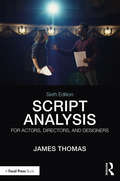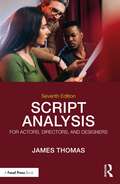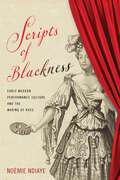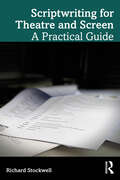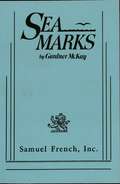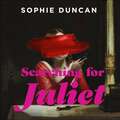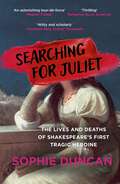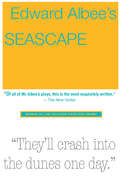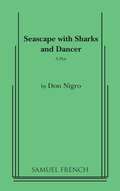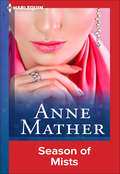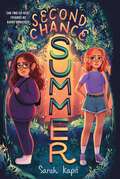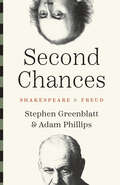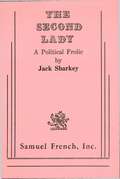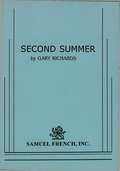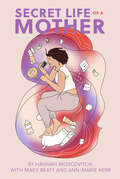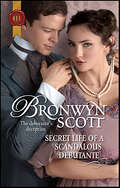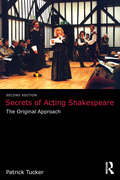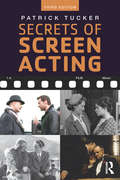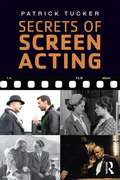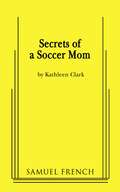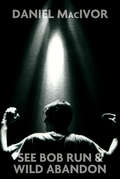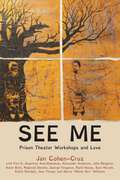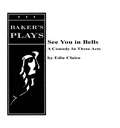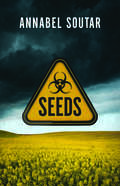- Table View
- List View
Script Analysis for Actors, Directors, and Designers
by James ThomasScript Analysis for Actors, Directors, and Designers, Sixth Edition teaches the skills of script analysis using a formalist approach that examines the written part of a play to evaluate its potentials for performance and production. This new edition offers a more streamlined experience for the reader and features new and revised content, such as a fully updated chapter on postmodern drama, new sections on Associative Thinking and Ambiguous Terms in the Introduction, and revised appendices featuring The Score of a Role and expanded treatments of Functional Analysis for Designers and Further Questions for Script Analysis. Explorations of both classic and unconventional plays are combined with clear examples, end-of-chapter summaries, and stimulating questions that will allow actors, directors, and designers to immediately incorporate the concepts and processes into their theatre production work. An excellent resource for students of Acting, Script Analysis, Directing, and Playwriting courses, this book provides the tools to effectively bring a script to life on stage.
Script Analysis for Actors, Directors, and Designers
by James ThomasScript Analysis for Actors, Directors, and Designers, Seventh Edition, teaches the skills of script analysis using a formalist approach that examines the written part of a play to evaluate its potentials for performance and production. This new edition features new and revised content, including an analysis of two new plays, Kalidasa’s Shakuntala and Federico Garcia Lorca’s The House of Bernarda Alba; information for the theatre designer integrated in chapters throughout the book; and an expanded appendix on critical approaches to script analysis. Explorations of both classic and unconventional plays are combined with clear examples, end-of-chapter summaries, and stimulating questions that will allow actors, directors, and designers to immediately incorporate the concepts and processes into their theatre production work. An excellent resource for students of acting, script analysis, directing, playwriting, and stage design courses, this book provides the tools to effectively bring a script to life on stage.
Scripts of Blackness: Early Modern Performance Culture and the Making of Race (RaceB4Race: Critical Race Studies of the Premodern)
by Noémie NdiayeScripts of Blackness shows how the early modern mass media of theatre and performance culture at-large helped turn blackness into a racial category, that is, into a type of difference justifying emerging social hierarchies and power relations in a new world order driven by colonialism and capitalism.In this book, Noémie Ndiaye explores the techniques of impersonation used by white performers to represent Afro-diasporic people in England, France, and Spain in the sixteenth and seventeenth centuries, using a comparative and transnational framework. She reconstructs three specific performance techniques—black-up (cosmetic blackness), blackspeak (acoustic blackness), and black dances (kinetic blackness)—in order to map out the poetics of those techniques, and track a number of metaphorical strains that early modern playtexts regularly associated with them. Those metaphorical strains, the titular scripts of blackness of this book, operated across national borders and constituted resources, as they provided spectators and participants with new ways of thinking about the Afro-diasporic people who lived or could/would ultimately live in their midst.Those scripts were often gendered and hinged on notions of demonization, exclusion, exploitation, animalization, commodification, sexualization, consensual enslavement, misogynoir, infantilization, and evocative association with other racialized minorities. Scripts of Blackness attempts to grasp the stories that Western Europeans told themselves through performative blackness, and the effects of those fictions on early modern Afro-diasporic subjects.
Scriptwriting for Theatre and Screen: A Practical Guide
by Richard StockwellScriptwriting for Theatre and Screen: A Practical Guide is an introduction designed to help readers understand the nature of dramatic scriptwriting and quickly guide them to a place where they can write, first a short play, and then a short screenplay.The book clearly points out not only the differences between writing for the stage and writing for the screen, but also the shared skills and the fundamental dramatic principles that unite them. The two sections (Theatre Writing and Screenwriting) are connected by a bridging chapter that explores similarities and differences between the two media. The chapters are arranged with a short introductory essay on topics such as generating ideas, structure, character, modes of address, empathy, status, visual writing, and revising and editing, followed by practical exercises with exemplar responses – including a sample short play and film. Two additional chapters address how to approach writing a self-reflexive commentary, explore how the skills covered can be applied to writing for television, and explain other skills a writer might need to develop when working in this industry.This complete introduction to writing dramatic scripts is intended for students of playwriting and screenwriting but is also suitable for all writers new to these areas and interested in developing their skills.
Sea Marks
by Gardner MckayDrama / 1m, 1f / Unit Set / Winner of L.A. Drama Critics Circle Best Play Award, this is the touching story of a fisherman living on a remote Irish island who has fallen in love with a woman he's glimpsed only once. Unschooled in letter writing, he tries his utmost to court by mail and after a year and a half succeeds in arranging a rendezvous at which, to his surprise, she persuades him to live with her in Liverpool. Their love affair ends when he is forced to return to a life he understands.
Searching for Juliet: The Lives and Deaths of Shakespeare's First Tragic Heroine
by Sophie Duncan'A thirteen-year-old girl is at a party. A boy, slightly older, sees her. Juliet. This book is about that girl.'A cultural, historical and literary exploration of the birth, death and legacy of the ultimate romantic heroine - Shakespeare's Juliet Capulet.Juliet Capulet is the heartbeat of the world's most famous love story. She is an enduring romantic icon. And she is a captivating, brilliant, passionate teenage girl who is read and interpreted afresh by each new generation.Searching for Juliet takes us from the Renaissance origin stories behind William Shakespeare's child bride to the boy actor who inspired her creation onstage. From enslaved people in the Caribbean to Italian fascists in Verona, and real-life lovers in Afghanistan. From the Victorian stage to 1960s cinema, Baz Luhrmann and beyond.Sophie Duncan draws on rich cultural and historical sources and new research to explore the legacy and reach of Romeo and Juliet far beyond the literary sphere. With warmth, wit and insight, she shows us why Juliet is for now, for ever, for everyone.(P)2023 Hodder & Stoughton Limited
Searching for Juliet: The Lives and Deaths of Shakespeare's First Tragic Heroine
by Sophie Duncan'Witty and scholarly'JONATHAN BATE, SUNDAY TELEGRAPH'Thrilling'GUARDIAN'Illuminating . . . as vital and provocative as the character herself'LITERARY REVIEW'Buoyant'TIMES LITERARY SUPPLEMENT'An astonishing tour-de-force'MARION TURNER, author of The Wife of Bath: A BiographyWho is Juliet Capulet?Daughter of VeronaLovestruck TeenagerRomantic IconTragic HeroineRebelSearching for Juliet takes us from the Renaissance origin stories behind Shakespeare's child bride to enslaved people in the Caribbean, Italian fascists in Verona, and real-life lovers in Afghanistan. From the Victorian stage to 1960s cinema, Baz Luhrmann, and beyond. Drawing on rich cultural and historical sources and new research, Sophie Duncan shows us why Juliet is for now, for ever, for everyone.
Seascape
by Edward AlbeeDealing with an almost surreal Howard Hughes-like figure, a bearded recluse who is the richest man in the world, this often comic and brilliantly revealing allegory continues the playwright's preoccupation with the mythic aspects of American life. <P><P> Pulitzer Prize Winner
Seascape with Sharks and Dancer
by Don NigroDrama / Casting: 1m, 1f / Scenery: Interior This fine work in the Pendragon cycle of plays enjoyed a sold out, critically acclaimed production at the world famous Oregon Shakespeare Festival. The play is set in a beach bungalow. The young man who lives there has pulled a lost young woman from the ocean. Soon, she finds herself trapped in his life and torn between her need to come to rest somewhere and her certainty that all human relationships turn eventually into nightmares. The struggle between his tolerant and gently ironic approach to life and her strategy of suspicion and attack becomes a kind of war about love and creation which neither can afford to lose. This is an offbeat, wonderful love story. Note: The play contains a wealth of excellent monologue and scene material.
Seascape: The Entire Appalling Business
by Edward Albee“Hats off, and up in the air! A major dramatic event.” The New York Times On the heels of the success of Edward Albee’s The Collected Plays of Edward Albee, Overlook brings back—in a stand-alone volume—one of Albee’s most cherished plays, a fantastic story of what it means to be alive—winner of the 1975 Pulitzer Prize for Drama. On a deserted stretch of beach, a middle-aged couple relaxes after a picnic lunch and converse idly about home, family, and their life together. She sketches; he naps. Then, suddenly, they are joined by two sea creatures, a pair of lizards from the depths of the ocean, with whom they engage in a fascinating dialogue. The emotional and intellectual reverberations of this bizarre conversation will linger in the heart and the mind long after the curtain falls—or the last page is turned.
Season of Mists
by Anne Mather"Our marriage was a farce," Piers said.Abby couldn't deny Piers's statement. Time had certainly proven that true, but the young Abby had loved him with all the passion within her.At that time she could not have foreseen the awful events that had led him to deny his own son. Abby had done the only thing possible, she'd fled.For twelve years she thought she hated Piers, and then he came back into her life. Try as she did to fight it, she realized hopelessly that she was as vulnerable as ever to his attraction.
Second Chance Summer
by Sarah KapitBreaking up is hard to do, especially when it's with your best friend. Can these two ex-besties survive summer camp together? Maddie and Chloe have always been best friends, until last year, when Chloe’s popularity and budding fame as an actor left Maddie in the dust one too many times. Their friendship is over, and they’re both ready to move on.But when the girls arrive at summer camp, they discover that the universe isn’t ready to let go of this friendship just yet: They’re cabinmates, and each of them has to spend the summer with her ex–best friend. Is it time to try again, or are they doomed to drift apart for good?
Second Chances: Shakespeare and Freud (The Anthony Hecht Lectures in the Humanities Series)
by Stephen Greenblatt Adam PhillipsA powerful exploration of the human capacity for renewal, as seen through Shakespeare and Freud In this fresh investigation, Stephen Greenblatt and Adam Phillips explore how the second chance has been an essential feature of the literary imagination and a promise so central to our existence that we try to reproduce it again and again. Innumerable stories, from the Homeric epics to the New Testament, and from Oedipus Rex to Hamlet, explore the realization or failure of second chances—outcomes that depend on accident, acts of will, or fate. Such stories let us repeatedly rehearse the experience of loss and recovery: to know the joy that comes with a renewal of love and pleasure and to face the pain that comes with realizing that some damage can never be undone. Through a series of illuminating readings, the authors show how Shakespeare was the supreme virtuoso of the second chance and Freud was its supreme interpreter. Both Shakespeare and Freud believed that we can narrate our life stories as tales of transformation, of momentous shifts, constrained by time and place but often still possible. Ranging from The Comedy of Errors to The Winter&’s Tale, and from D. W. Winnicott to Marcel Proust, the authors challenge readers to imagine how, as Phillips writes, &“it is the mending that matters.&”
Second Lady
by Jack SharkeyComedy / 3m, 4f / Interior / Thanks to an idiotic childhood promise, Presidential candidate Andrew Wright is engaged to Bertha Desiree Sprock a lady as lovely as her name. His unscrupulous campaign manager convinces Bertha she is the target of assassins and he cajoles Veronica Parkhurst, an absolute doll, to stand in for Bertha at the convention. Veronica so captivates the delegates that they want her as Andrew's running mate and Andrew and Veronica fall in love. Will Bertha spill the beans and destroy Andrew's career if he doesn't marry her? What is the codeword that causes the Secret Service to blast anyone who leaves the hotel suite? Why would the Queen of England audition for the Dallas cheerleaders? Where do you find a hotel chef who can provide hemlock? This is one of the most hyperactive political satires ever to romp across a stage.
Second Summer
by Gary RichardsComedy / 2m, 3f / Interiors / A good natured, affable man embittered by the death of his beloved wife reluctantly sells his business and home in Brooklyn and moves to Florida. In what he thought would be "God's waiting room," he finds a world of new possibilities as single women his age flock to charm the new, available man. This play by the author of Dividends is about the rebirth of an elderly man who finds that the long dormant teenager in himself still exists. It celebrates the richness of the mature life experience in a warmhearted comedy that clearly demonstrates it's not how old you are, it's how your are old!
Secret Life of a Mother
by Hannah MoscovitchThe raw and untold secrets of pregnancy, miscarriage, childbirth, and mothering are revealed in this true story of motherhood for the twenty-first century. A playwright writes an exposé of modern motherhood full of her own darkly funny confessions and taboo-breaking truths. One of her real-life friends, an actress, performs the piece, and through it her own experiences of motherhood start to surface. These mothers are not the butts of jokes, the villains, or the perfect angels of a household. This empowered and relatable play was written collaboratively between award-winning theatre artists Hannah Moscovitch, Maev Beaty, and Ann-Marie Kerr, with co-creator Marinda de Beer. Uplifting and full of love, Secret Life of a Mother is a generous and powerful act of truth-telling for anyone who has thought about, been, loved, known—or come from—a mother.
Secret Life of a Scandalous Debutante
by Bronwyn ScottJust another dull debutante?From boxing at Jackson's to dancing starry-eyed society belles around London's ballrooms, Beldon Stratten is the perfect English gentleman. And he's looking for a perfectly bland, respectable wife.Appearances can be deceiving...Exotic Lilya Stefanov is anything but bland. Beldon is intrigued to see that the ragamuffin girl he once knew has matured into an elegant lady, poised and polite!But beneath the mysterious beauty's evening gowns and polished etiquette lies a dangerous secret-and a scandalous sensuality...
Secrets of Acting Shakespeare: The Original Approach
by Patrick TuckerSecrets of Acting Shakespeare isn’t a book that gently instructs. It is a passionate, yes-you-can guide designed to prove that anybody can act Shakespeare. Patrick Tucker’s classic manual encourages trained and amateur actors alike to look to the original practices of the Elizabethan theatre for inspiration. He explores the ‘cue scripts’ used by actors, who knew only their own lines, to demonstrate the extraordinary way that these plays work by ear. This updated second edition includes: A section dedicated to the modes of address 'thee‘ and 'you‘ A brand new chapter on Original Practices and cue scripts An expanded genealogical chart, showing the interrelations of 92 different characters from the history plays A new discussion of Elizabethan acting spaces – balconies, gates, ramparts and even backstage areas Secrets of Acting Shakespeare is a must-read for actors intrigued by the ‘Original Approach’ to acting Shakespeare, or for anyone curious about how the Elizabethan theater worked.
Secrets of Screen Acting
by Patrick TuckerWhen it was first published in 1993, Secrets of Screen Acting broke new ground in explaining how acting for the camera is different from acting on stage. Reaction time is altered, physical timing and placement are reconceived, and the proportions of the digital frame itself become the measure of all things, so the director must conceptualize each image in terms of this new rectangle and actors must 'fit' into the frame. Based on a revolutionary non-Method approach to acting, this book shows what actually works: how an actor, an announcer--anyone working in front of the cameras--gives excellent performances on screen.Instead of starting with what is real and trying to wrestle that onto the screen, Patrick Tucker explains how to work with the realities of a shoot and work from there towards the real. His step-by-step guide to the elements of effective screen acting is an extension and explanation of a lifetime of work in the field, containing over 50 acting exercises and the tried-and-tested Screen Acting Checklist. As well as being completely updated to cover new techniques, film references and insights, this third edition now includes a set of Film Clip Time Codes for each film. These not only itemise the films discussed in each chapter, but also pinpoint the precise moments where each example can be found so that students, teachers, and professional actors can refer to them quickly and easily.
Secrets of Screen Acting Third Edition
by Patrick TuckerWhen it was first published in 1993, Secrets of Screen Acting broke new ground in explaining how acting for the camera is different from acting on stage. Reaction time is altered, physical timing and placement are reconceived, and the proportions of the digital frame itself become the measure of all things, so the director must conceptualize each image in terms of this new rectangle and actors must 'fit' into the frame. Based on a revolutionary non-Method approach to acting, this book shows what actually works: how an actor, an announcer--anyone working in front of the cameras--gives excellent performances on screen.
Secrets of a Soccer Mom
by Kathleen ClarkFull Length, Comedy / 3 f / Exterior / Formerly titled: Soccer Moms. Three engaging women reluctantly take the field in a mothers vs. sons soccer game. They intend to let the children win, but as the game unfolds they become intent on scoring. The competition ignites a fierce desire to recapture their youthful good-humor, independence and sexiness, paving the way toward a better understanding of themselves, their families and changes they need to make in their lives. "Let's hear it for Soccer Moms, a diverting comedy with a slick style and attention, holding crisp dialogue.''-The New York Times
See Bob Run & Wild Abandon
by Daniel MacivorBob is on the road. Bob is on the run. But from what, or whom, is she running? Follow Bob as she hops from car to car telling her story to unsuspecting drivers as she tries to put her life in the rear-view mirror. Will she make it to her destination? And what will she find when she gets there? Find out in the critically adored See Bob Run."...the ironic name stands in sharp contrast to this perceptive and thoroughly engrossing one-woman show." —Toronto StarIn Wild Abandon we are introduced to Steve, a man alone in the world. Steve is acerbic, opinionated, and desperate to figure himself out. As he recounts his life story, we follow Steve out the door of his strict Catholic home, through diners and bars and parks as we hear the tales that made the man. Wild Abandon is a story about running away, and about how to find your way home again."...a one-man show without valleys. It's a wonderful piece—honest, imaginative, profound, moving and very funny." —Carole Corbeil
See Me: Prison Theater Workshops and Love
by Jan Cohen-CruzEncounters, transformations, and reflections from in-prison and post-release theater workshopsSee Me is a collection of intimate dialogues about collective experiences in the context of prison theater workshops. Each essay is a collaboration between two or three people who connected profoundly in the temporary community that a workshop can create. Part I is an exchange grounded in the prison theater workshop between the author and one of the incarcerated participants. They alternately tell the story of what they found in the workshop, each other, the future they imagined together, and the social turmoil and utopian aspirations of the times. Part II consists of essays jointly written by eight other people impacted by close relationships spawned in diverse in-prison and re-entry theater workshops.
See You In Bells
by Edie ClaireThe mother of the bride has every reason to panic. Three generations of Bower family weddings - three inexplicable disasters. Now, with the church building falling down, half the wedding party AWOL, and the bride's sisters still fighting over what happened at the last family wedding, daughter Jenna's nuptials seem hopelessly doomed. But peacemaking brother Brian is determined to end the sisters' feud - and the family curse. All he needs is to stage a rip-roaring intervention - and pray it turns divine!
Seeds
by Annabel SoutarPart courtroom drama and part social satire, Seeds presents an intelligent portrait of farming and scientific communities in conflict and at the same time penetrates the complex science of genetically modified crops. The play documents the 2004 Supreme Court of Canada showdown between Saskatchewan farmer Percy Schmeiser and biotech multinational Monsanto Inc., a David-and-Goliath struggle that cast Schmeiser as the small-farmer underdog fighting the unscrupulous major corporation. Monsanto accused him of growing their genetically patented Round-up Ready canola seeds on his property without paying the licensing fee they require. Through a suspenseful labyrinth of legal conflicts regarding patent rights, scientific showdowns about GM food and property clashes between farmers and the biotechnology industry, Seeds asks the essential question: "Can you patent a living thing?" Or as Schmeiser famously asked, "Who owns life?"A most interesting aspect of the play is the ambiguity around the hero Percy Schmeiser. Is he a victim or an opportunist and self-publicist? Certainly, he's no innocent; as he keeps telling us, he's an experienced politician, in fact an ex-mayor. He's a believer who knows how to frame his beliefs to advantage. He can be grand and he can be petty - and as such he is antihero as much as hero.Named the top play of the decade by Rover Arts in its review of English theatre in Montreal between 2000 and 2010, Seeds takes us back to the seminal moment when a single farmer stood up to international agribusiness and almost won.Cast of 4 women and 3 men.
